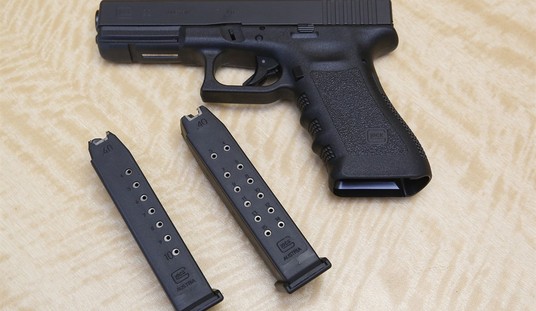I’m seeing a lot of hot takes about how Chief Justice Roberts seemed to side with the attorney representing New York City in the oral arguments that took place today in the NYSRPA v NYC case, but now that I’ve had a chance to read the transcript of the oral argument, I think folks are reading too much into the few questions by the Chief Justice.
There was little questioning on the actual New York City law being challenged, in part because the city changed the law several months ago in a transparent attempt to avoid judicial review. Whether or not they succeeded in making the case moot took up much of the hour long back and forth between attorneys and the nine justices.
One thing that’s worth noting is that while both Paul Clement, the attorney representing the New York State Rifle & Pistol Association and several of its members, and Principle Deputy Solicitor General Jeffrey Wall (who was there representing the U.S. government) both agree that the case isn’t moot, they disagreed about why that’s so.
Clement argued to the judges that his clients have not received all of the relief they would have received had the Court struck down the law as unconstitutional, arguing that in the revised transportation law, gun owners transporting their firearms under a “premises license” must engage in “continuous and uninterrupted travel” to their destination. Had the law been struck down or an injunction granted instead of simply being revised by the city, Clement said, his clients wouldn’t be left trying to figure out what falls under that definition, and their rights are still being curtailed.
Wall, on the other hand, argued that while the city’s revised law may pose a lot of questions, they’re new questions, and fall outside of the scope of this lawsuit. Instead, Wall claims that the plaintiffs are entitled to ask for damages, but if the case is moot their ability to do so would be curtailed.
The Court’s left wing pressed Wall and Clement about their positions, and Wall admitted that the damages argument was one that wasn’t a part of the original complaint. But, he said, there’s been a lot of new activity on both sides since the Supreme Court agreed to hear the case, including the city’s attempt to try and moot the lawsuit without declaring that it’s old law violated anybody’s constitutional rights.
The only time Chief Justice Roberts asked any questions was during the argument by Richard Dearing, the attorney representing New York City. While Roberts did ask a question about mootness, I don’t see it (as other commentators have) as a sign that Roberts is leaning towards dismissing the case.
CHIEF JUSTICE ROBERTS: Is there — is there any way in which any violation could prejudice a gun owner?
MR. DEARING: Not that — not that I can think of. The city is committed to — to closing the book on that old rule and we’re not going to take it into effect.
CHIEF JUSTICE ROBERTS: Is there any way in which a finding of mootness would prejudice further options available to the Petitioners in this case, for example, seeking damages?
MR. DEARING: I don’t — I don’t think so. I mean, they — they — it’s possible they’d have — they’d have a time bar on — on — on damages, but it depends — it would depend on the allegation they’ve made. They’ve never made any allegations related to damages, and I think we’d have to assess that based on the allegations they make.
I don’t think you can read too many tea leaves into that interaction. For one thing, Dearing was less than positive that the plaintiffs could seek damages if the case was mooted, so if that was the single solitary sticking point for Justice Roberts, I don’t think Dearing convinced him.
More importantly, as Justice Gorsuch reminded the Court in his questioning of Dearing, the city is now saying lots of things to try and avoid a Supreme Court decision, including telling the justices that the city won’t even enforce the “continuous and uninterrupted” regulations (though of course it will remain on the books).
JUSTICE GORSUCH: I JUST want to circle back to the direct and continuous travel requirement of the current rule and Justice Alito’s question about visiting your mother. Is it now the city’s position that any reasonable stops are permissible?
MR. DEARING: That is our enforcement — reasonably necessary stops in the course of travel —
JUSTICE GORSUCH: Reasonably necessary.
MR. DEARING: — are permissible.
JUSTICE GORSUCH: Now does that include stopping to visit your mother —
MR. DEARING: I haven’t — I’m —
JUSTICE GORSUCH: Or use the —
MR. DEARING: I’m not sure I know the answer to that.
JUSTICE GORSUCH: Get a cup of coffee? I mean, I’m not sure a cup — is coffee reasonably necessary? (Laughter.)
MR. DEARING: Probably depends who you ask. But the Police Department has — (Laughter.)
MR. DEARING: The Police Department has affirmed and we have made clear that — the enforcement position is that a stop for a cup of coffee is not a problem.
JUSTICE GORSUCH: So that’s reasonably MR. DEARING: And in fact — JUSTICE GORSUCH: — necessary. So what — what’s going to qualify? I — I’m just a little unclear about that.
MR. DEARING: I think that — well, the controlling standard here — I’m — I’m giving you the enforcement position of the Police Department on the questions we have considered. But the controlling standard here, I should hasten to add, is provided by state law. We — we do not offer a definitive — cannot offer a definitive construction of that law. And I think the — the question about what that state law means is one that’s going to need to be litigated probably in state courts, but before there’s any dispute here ripe for — for constitutional adjudication, the meaning of that law is going to have to be determined.
JUSTICE GORSUCH: So we have no representations to us as to what is — is direct and continuous, other than coffee is okay.
MR. DEARING: Coffee — what — what I know — what I — what I can represent because — because it’s come up before, coffee, restrooms, food, gas, the kinds of things that you ordinarily would stop for in the course of — of travel, I hadn’t considered the mother or mother-in-law example before. I think that’s going to need to play out in the state courts.
The more important point here, though, is that none of those issues were ever part of this controversy. The — this controversy was about two things, as repeatedly emphasized by Petitioners throughout the —
JUSTICE GORSUCH: I understand —
MR. DEARING: — litigation.
JUSTICE GORSUCH: — that. But you’re asking us to say that there is no controversy now. So I am trying to just nail down exactly what is the delta, if any, remaining in the relief that might have been sought and the relief you’ve provided.
Ultimately, New York City’s argument boils down to this: Because we revised the challenged law, this case is now moot. Even though the revised law raises constitutional questions of its own, that will require separate litigation and the Supreme Court has no place to weigh in now.
If that argument is allowed to prevail, what’s to stop any anti-gun jurisdiction from tweaking their laws to get rid of any suits that might reach the Supreme Court, while continuing to infringe on the rights of residents with their revised laws?
New York City and even New York State have gone to great lengths to try and moot this case, but they only did so after the Supreme Court agreed to hear the case. It’s not that any politician in New York suddenly decided the old law was constitutional. They just became terrified that the Supreme Court was going to have a chance to hear another case dealing with the Second Amendment. Gun control advocates have been working with lawmakers since the McDonald decision in 2010 to keep gun cases away from the Supreme Court. It’s why Illinois has “shall issue” concealed carry laws, and Washington, D.C. as well.
Anti-gun activists have been willing to accept some pretty big losses at the appellate level rather than appeal to the Supreme Court, because they are petrified over the prospect of another ruling in favor of the Second Amendment. They couldn’t stop this case, however, because they won in the 2nd Circuit Court of Appeals. It wasn’t up to the city to appeal to the Supreme Court. The only thing gun control advocates could do was to convince the city and state to change the law in an attempt to make the case disappear.
If it does, there’s nothing stopping the Democrat-dominated legislature and New York City Council from revising the laws once more, perhaps imposing more onerous restrictions on license holders or perhaps even going back on what their attorney told the Supreme Court today.
We’ll see what the Court decides, but I have to say I’ll be very disappointed if Chief Justice Roberts decides that gaming the legal system as New York City is trying to do is acceptable and decides to moot the case. There are other Second Amendment cases waiting in the wings if that happens, but this case and New York City’s flagrant attempts to avoid judicial scrutiny deserve an official opinion by the Court.









